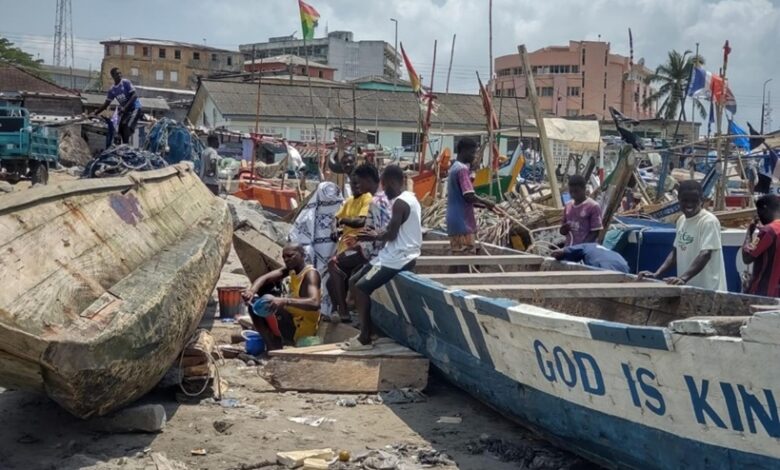Illegal fishing activities threaten sustainability of Ghana’s fisheries sector

Story: Isaac AIDOO, Accra
Ghana’s fisheries sector, a vital contributor to the country’s economy, faces mounting challenges from illegal fishing activities that threaten its sustainability. The sector provides jobs and nutrition for millions, but the actions of illegal foreign fishing trawlers have depleted fish stocks, undermined local livelihoods, and endangered the nation’s food security.
Invasion by foreign trawlers
One of the most alarming issues plaguing the industry is the sheer number of foreign fishing trawlers operating in Ghanaian waters. A study by the Overseas Development Institute (ODI) revealed that 137 foreign trawlers, primarily from Asia, are active in Ghana’s territorial waters. This figure is nearly triple the optimal number of vessels recommended for sustainable fishing.
Prof. Wisdom Akpalu, a fisheries economist at the Ghana Institute of Management and Public Administration (GIMPA), suggests that Ghana’s waters can sustainably support only 48 trawlers. “With just about 48 vessels, the country can generate the highest benefits from the sector,” he noted.
Local fishers, however, believe the problem is even worse. Adjetey Tawia, organizer of the Canoe and Fishing Gear Owners Association in Tema, expressed frustration:
“From 2001, when we received the Chinese trawlers into our oceans, a lot of damage has occurred. We have 74 Chinese trawlers, but we know the actual number is far higher. How can you allow so many to work in our small ocean?”
The Fisheries Commission’s data adds to the confusion. Official records for 2021 indicate 80 registered vessels, a number that does not align with the ODI study or fishermen’s accounts. The discrepancies highlight a lack of transparency and enforcement, allowing illegal operators to thrive.
Regulatory Gaps and Beneficial Ownership Oversight
The crisis is compounded by a regulatory oversight: the exclusion of the fisheries sector from Ghana’s beneficial ownership (BO) regime. The BO framework, designed to reveal the true owners of companies, currently focuses on high-risk industries like finance, petroleum, and mining.
Deputy Chief Company Inspector at the Office of the Registrar of Companies (ORC), Mrs. Yayira Banini, acknowledged this gap:
“The fisheries sector is not considered a high-risk area under the current law. However, there is a need to amend the law to include it, given the growing challenges in the sector.”
Data from the ORC reveals that none of the eight fishing companies sampled in 2021 filed BO information. While the shareholder structures comply with the Fisheries Act, 2002 (Act 625), most are dominated by foreign interests. For instance, the directors of Dong Sheng Limited, one of the sampled companies, are of Asian origin, with Rongcheng Ocean Fishing Co. Ltd. holding the majority stake.
Impact on Local Livelihoods and Food Security
Illegal fishing activities have significantly eroded the gains made in Ghana’s fisheries sector. Local fishermen, whose livelihoods depend on sustainable fish stocks, are left struggling as trawlers engage in practices like saiko, a destructive method where industrial trawlers transfer by-catch to local canoes for resale.
The depletion of fish stocks also poses a severe threat to Ghana’s food security. Fish remains a primary source of protein for many Ghanaians, and declining availability could lead to higher prices and malnutrition in vulnerable communities.
A Call for Urgent Action
To save Ghana’s fisheries sector, urgent measures are required. These include:
- Strengthening Enforcement: The Fisheries Commission must enforce stricter monitoring of trawler activities and prosecute violators.
- Amending the BO Law: Including the fisheries sector in Ghana’s BO regime would ensure transparency in ownership structures and curb illegal foreign influence.
- Reducing Vessel Numbers: Aligning the number of active trawlers with sustainable limits would help restore fish stocks and benefit local communities.
- Enhancing Data Accuracy: Authorities must reconcile conflicting datasets to improve transparency and inform policy decisions effectively.
The fisheries sector holds immense potential for economic growth and food security, but only if swift action is taken to address these challenges. With coordinated efforts from stakeholders, the industry can recover and thrive, ensuring its benefits are preserved for future generations.




